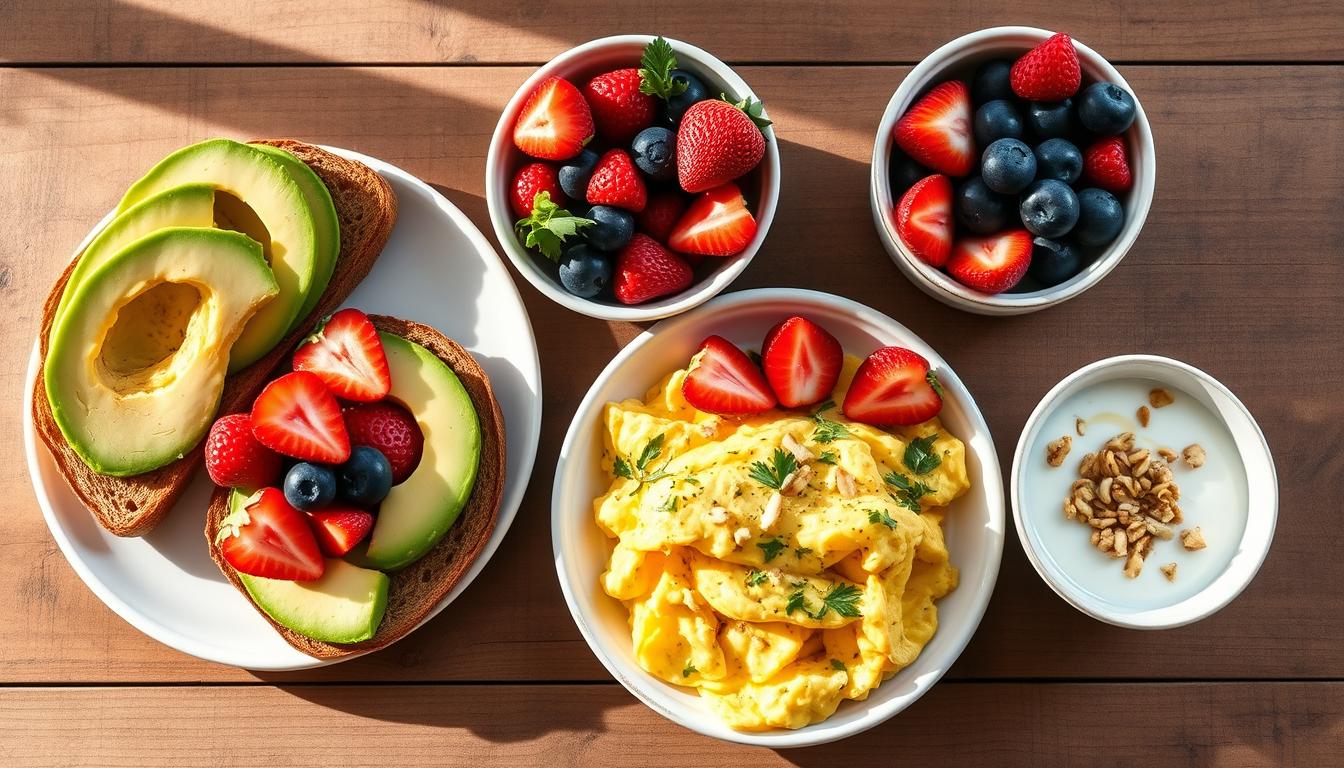Diabetic breakfast ideas have been artfully modified to ensure they’re low in saturated fat, sodium, and calories, making them a smart and wholesome start to any day1. With options like the fiber-rich oats paired with sausage, greens, and tomatoes, you receive a balanced meal that’s both nutritious and satisfying12. And for those mornings when you need a quick start, low-calorie egg and ham cups packed with veggies offer almost no carbs and can be easily grabbed from the fridge2. Or indulge in the Mediterranean-inspired Socca, with chickpea flour pancakes topped with roasted veggies and a modest calorie content12.
But that’s not all—low carb meals for diabetics recipes also cater to those who love a hint of sweetness to kick-start their day. Chia seeds are added to recipes for that boost of heart-healthy omega-3s, while still keeping breakfast light and full of flavor1. And to keep a check on portions without compromising taste, innovative uses of ingredients like barley and cauliflower add nutrition and texture to your morning meal1. Healthy breakfast recipes are not about restrictions but rather smart substitutions and additions to make every breakfast a feast for your taste buds and a gift to your health.
Key Takeaways
- Low carb doesn’t mean low taste—explore diverse and delicious options.
- Breakfasts tailored for diabetic diets can also be rich in nutrition and flavor.
- Innovative diabetic breakfast recipes promote better blood sugar control.
- Quality ingredients like chia seeds, oats, and fresh fruit add health benefits to meals.
- Meal prepping and mindful portion control are key to convenient breakfast times.
The Importance of Breakfast for Diabetics
Understanding how morning meals affect blood sugar is key for managing diabetes through diet. Breakfast is often called the most important meal of the day. It plays a big role for those with diabetes.
Skipping Breakfast and Its Impact on Blood Sugar Levels
Skipping breakfast can cause big spikes in blood sugar and higher BMI. These are bad for people with diabetes. Studies show skipping breakfast increases the risk of Type 2 diabetes3.
Not eating in the morning also leads to higher blood sugar levels later in the day3. This shows how crucial a balanced diabetic breakfast is for keeping blood sugar in check all day. https://mymealrecipes.com/delicious-low-carb-brunch/
The Role of Balanced Meals in Diabetes Management
Managing diabetes well means eating balanced, nutritious meals. A breakfast that balances macronutrients and is high in fiber helps control blood sugar4. People with diabetes should aim for at least 35 grams of fiber a day, more than the average adult3.
Starting with a diet that includes lean proteins, like Greek yogurt, helps release energy slowly3. Adding healthy fats from avocados, which are good fats without cholesterol4, and choosing low glycemic index carbs can also help keep blood sugar stable3.
Eating diabetes-friendly meals with non-starchy veggies, moderate protein, and measured fats helps avoid morning high blood sugar3. Regular meal prep ensures these healthy choices are always available3.
Planning meals with a variety of nutrient-rich, diabetes-friendly options can make managing diabetes easier. It’s not just about cutting carbs. It’s about finding a balance that supports overall health.
Key Considerations for Diabetic-Friendly Breakfasts
Creating a diabetic-friendly breakfast is all about balance. It’s about mixing carbs, proteins, fibers, and healthy fats right. These elements help control blood sugar levels. For those with diabetes, choosing the right breakfast foods is key to staying healthy.
Carbohydrates, Fiber, Protein, and Healthy Fats
Start your day with a balanced meal. Aim for 45-60 grams of carbs, 3-6 grams of fiber, 15-25 grams of protein, and 10-15 grams of healthy fats5. This mix helps energy release slowly, preventing blood sugar spikes.
Choose low-glycemic foods like oats and low-fat Greek yogurt. Oats have 5 grams of fiber per serving, slowing digestion and blood glucose impact5. Greek yogurt, with about 20 grams of protein, is both filling and nutritious5.
Understanding Glycemic Index and Its Impact
The glycemic index (GI) is crucial for diabetes management. Foods with low GI raise blood sugar slowly. This is important for keeping blood sugar levels stable all day.
Eating low GI foods for breakfast can lower blood sugar levels after eating5. Try adding rolled oats, cottage cheese, and low-carb tortillas to your breakfast. These can make your mornings better while keeping GI in check5.
Use diabetic meal prep ideas like hard-boiled eggs to ensure nutritious breakfasts5. This saves time and meets the nutritional needs for diabetes management.
Simple and Satisfying Breakfast Options
Starting your day with the right meal is key, especially if you have diabetes. It’s important to balance your macronutrients and pick low-sugar foods. This can help control your blood sugar and improve your health. Here are some nutritious and tasty breakfast ideas for diabetics, including keto and sugar-free options.
Greek Yogurt with Fresh Berries and Nuts
Greek yogurt is a great choice for a protein-packed breakfast. Adding fresh berries and nuts boosts the flavor and adds fiber and healthy fats. Greek yogurt has about 20 grams of protein per serving. This helps keep you full and manage your blood sugar levels6.
Oatmeal with Protein-Rich Toppings
Oatmeal is a great base for toppings that boost your breakfast’s nutrition. A serving of oatmeal has about five grams of dietary fiber. This helps slow down sugar absorption and keeps you feeling full. Add nuts or cottage cheese for extra protein to prevent blood sugar spikes6.
Healthy Toast Topped with Avocado, Nut Butters, or Eggs
Toast can be more than just butter and jam. Choose wholegrain bread like multi-seed or granary for a lower glycemic index. This helps manage blood sugar levels7. Top it with avocado or nut butters for healthy fats and fiber. Add a cooked egg for a protein boost. This makes for a satisfying and healthy meal for diabetics.
Adding these simple yet effective breakfast ideas to your routine can make managing your diet easier and more enjoyable. Each option balances macronutrients to support blood sugar control and overall health. This way, you can start your day off right.
Savory Breakfast Recipes for Diabetics
Starting your day with a healthy, savory meal is key. It should fit into a diabetic-friendly eating plan. Let’s explore some tasty options that meet dietary needs and add variety to your meals.
Veggie-Loaded Omelets and Frittatas
Veggie-loaded omelets and frittatas are great for beginners. They can include complex carbs like whole grains, which are good for diabetics8. Try a recipe with cauliflower rice instead of potatoes for a low-carb option. Pair it with turkey sausage to keep fat levels low8.
Shakshuka: Eggs Poached in Spicy Tomato Sauce
Shakshuka is a vibrant dish of eggs in spicy tomato sauce. It’s perfect for adding excitement to your meals. It’s filled with non-starchy veggies and has plenty of protein to help control blood sugar9.
Egg Scrambles with Turkey or Chicken Sausage
Egg scrambles with lean meats like turkey or chicken sausage are quick and satisfying. They help control unhealthy fats and boost protein, which is good for diabetics8. Quick recipes are great for busy mornings, keeping you energized all day8.
These savory breakfasts are hearty and diabetes-friendly. They ensure balanced nutrition without raising blood sugar. Adopting these ideas simplifies your mornings and supports your health goals.
Sweet Diabetic Breakfast Ideas
Starting your day with healthy diabetic meals is easy with tasty recipes. Sweet breakfasts can satisfy your cravings and fit into a diabetic-friendly meal planning lifestyle. Here are some delicious, non-egg low-carb breakfast ideas.
Oat Pancakes with Fresh Fruit and Nut Butters
Make traditional pancakes healthier by using oat flour instead of regular flour. Top them with fresh berries and almond or peanut butter for extra sweetness and creaminess. These pancakes are not only delicious but also keep your energy up all morning.
High-Protein Smoothies with Added Veggies and Seeds
For a quick, nutritious breakfast, try a high-protein smoothie. Add spinach or kale for vitamins and fiber, and chia or flaxseed for omega-3s. This smoothie is packed with nutrients that help manage blood sugar and is easy to make on busy days.
These options are great for a balanced diet and show that diabetic-friendly meal planning can be exciting. You can enjoy a variety of healthy, flavorful choices that make breakfast both fun and nutritious.
| Recipe | Calories | Carbohydrates (g) | Fiber (g) | Protein (g) | Fat (g) |
|---|---|---|---|---|---|
| Oat Pancakes | 24010 | 910 | 710 | 1110 | 1810 |
| Fruit & Nut Butter Topping | Adds ~160 | Adds ~15 | Adds ~3 | Adds ~4 | Adds ~9 |
| High-Protein Smoothie | 15010 | 2010 | 710 | 410 | 610 |
These meals fit perfectly into a diabetic-friendly meal planning lifestyle. They ensure you start your day with something delicious and nutritious. Enjoying these healthy diabetic meals helps control blood sugar and improves overall health.
Low-Carb Diabetic Breakfasts
Finding healthy breakfasts for diabetics can be tough. Low-carb options are key to keeping blood sugar in check all day.
Egg Muffins and Quiches
Egg muffins and quiches are great for diabetics. They’re easy to make and packed with veggies and protein. A good diabetic breakfast should have 15-25g of protein and 10-15g of healthy fats11. Eggs are also good for blood sugar levels12.
Baked Eggs in Tomato Cups
Baked eggs in tomato cups are tasty and low in carbs. Tomatoes help control blood sugar, and eggs are protein-rich12. This dish is perfect for diabetics, offering the right mix of nutrients.
Chickpea Flour Pancakes (Socca) with Roasted Veggies
Chickpea flour pancakes with roasted veggies are a tasty twist on breakfast. They’re low in carbs and high in protein and fiber11. Adding greens or Greek yogurt boosts protein, helping you feel full longer11.

For more ideas on low-carb breakfasts, check out nutritionist-approved recipes. These choices can help manage your diabetes and make mornings better.
Make-Ahead Breakfast Options for Busy Mornings
Mornings can be chaotic, but with some planning, you can have healthy and tasty breakfasts. We’ve picked out some great diabetic breakfast recipes that are good for your health. Try diabetic meal prep to make your mornings easier.
Hard-Boiled Eggs and Nut Packs
Hard-boiled eggs are perfect for quick, protein-packed breakfasts. Add a mix of nuts for a balanced meal that’s good for diabetics. This combo keeps you full and follows a low-carb diet13.
Breakfast Burrito Meal Prep
Start your day with a tasty, reheatable breakfast burrito. It’s filled with scrambled eggs, spinach, mushrooms, and low-fat cheese in a low-carb tortilla. These burritos are great for freezing and are a quick, healthy option1314. On busy days, just reheat one for a meal that’s good for your blood sugar and fits your prep schedule.
Overnight Oats and Chia Puddings
Overnight oats and chia puddings are easy, trendy breakfasts that are great for prep. Add berries, nuts, and coconut milk to make them fit your diet. These breakfasts meet your dietary needs and save you time in the morning13.
| Recipe Type | Key Ingredients | Prep Time | Storage Tips |
|---|---|---|---|
| Hard-Boiled Eggs with Nuts | Eggs, Mixed nuts | 10 minutes | Refrigerate up to one week |
| Breakfast Burrito | Low-carb tortilla, eggs, spinach, mushrooms, cheese | 20 minutes | Freeze up to three months14 |
| Overnight Oats | Oats, berries, nuts, coconut milk | 15 minutes | Refrigerate up to five days |
Each recipe supports diabetic meal prep and lets you make breakfast the night before. This ensures a healthy, controlled carb meal that fits your diabetic diet plan.
Meal Planning and Portion Control
Planning meals well is key for managing blood sugar and eating healthy. Focusing on low-carb meals helps control calories and enjoy a wide range of healthy foods. We’ll look at how meal planning and portion control can improve health.
Creating a Balanced Breakfast Routine
Starting your day with a good meal is especially important for those with diabetes. A balanced breakfast should have protein, fats, and carbs to keep blood sugar stable. A medium slice of bread, with about 15 to 20g of carbs, is a good low-carb choice for breakfast15.
Preparing meals for the week ahead is helpful. It ensures all meals are ready, portioned out, and easy to grab each day16.

Tips for Mindful Eating and Portion Sizes
Mindful eating means focusing fully on your food. Knowing how to control portions helps manage meal sizes, weight, and blood sugar. Using the plate method can help balance food intake17.
This method helps eat the right amount of veggies, lean proteins, and carbs. It promotes feeling full and balanced nutrition17.
| Meal Type | Carb Content | Portion Size |
|---|---|---|
| Medium-sized slice of bread | 15-20g | 1 slice |
| Large jacket potato | Up to 90g | 1 medium potato |
| Breakfast “muffin” | Varies | 1 muffin |
By planning meals and controlling portions, people with diabetes can manage their condition well. They can also enjoy a variety of tasty meals. Always talk to a healthcare professional before starting a new diet, especially if it’s low-carb15.
Conclusion
Starting a journey in diabetic-friendly meal planning is a big step towards controlling blood sugar and finding balanced nutrition for diabetics. Studies show that eating low-carb in the morning can really help. It can lower blood sugar levels by 74% in people with type 2 diabetes compared to a regular breakfast18.
A 12-week study with 127 people found that sticking to this diet can improve blood sugar and glucose monitoring without affecting weight or waist size18. This makes foods like egg muffins, yogurt with nuts, and omelets with lots of veggies good choices for a diabetes-friendly diet.
Looking at more studies, we see that a ketogenic diet can help control blood sugar in type 2 diabetes. Also, eating carbs evenly in the morning can affect how our body reacts to them19. Eating eggs for breakfast can help keep blood sugar stable and reduce hunger later, showing how important what we eat for breakfast is19.
Choosing what to eat for breakfast is not just about taste. It’s about taking care of our health. Eating breakfasts full of fiber, protein, and healthy fats, in the right amounts, can change how we manage diabetes every day. Making these small, consistent choices can lead to lasting health benefits and a better life for those with diabetes.https://mymealrecipes.com/

